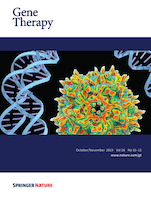
GENE THERAPY
Scope & Guideline
Pioneering Innovations in Genetic Healing
Introduction
Aims and Scopes
- Gene Therapy Mechanisms:
Research on the mechanisms by which gene therapies influence cellular processes, including gene editing techniques like CRISPR/Cas9, viral vector delivery systems, and RNA-based therapies. - Cancer Biology:
Investigation of the molecular and genetic underpinnings of cancer, including tumor microenvironment interactions, signaling pathways, and the role of non-coding RNAs. - Immunotherapy Innovations:
Exploration of innovative immunotherapeutic strategies, including CAR-T cell therapies, immune checkpoint inhibitors, and the modulation of immune responses to enhance anti-tumor efficacy. - Biomarkers and Therapeutic Targets:
Identification and validation of biomarkers for cancer diagnosis, prognosis, and treatment response, as well as potential therapeutic targets for novel cancer therapies. - Clinical Applications and Trials:
Research focusing on the clinical implications of gene therapies and the results of clinical trials evaluating the safety and efficacy of new therapies in patients.
Trending and Emerging
- RNA Modifications and Non-coding RNAs:
The role of RNA modifications, particularly N6-methyladenosine (m6A), and non-coding RNAs (like lncRNAs and circRNAs) in cancer progression and therapy is gaining traction, highlighting their potential as therapeutic targets. - Oncolytic Virus Therapies:
Research on oncolytic viruses as a novel cancer treatment modality is on the rise, with studies exploring their mechanisms of action and combination with immunotherapies to enhance therapeutic outcomes. - Synthetic Lethality Approaches:
The concept of synthetic lethality, particularly in the context of targeting specific genetic vulnerabilities in tumors, is increasingly being explored as a strategy for developing more effective treatments. - Microbiome and Cancer Interactions:
Emerging studies are investigating the influence of the microbiome on cancer development and treatment responses, indicating a new frontier in understanding cancer biology. - Personalized and Precision Medicine:
There is a growing emphasis on personalized medicine approaches that tailor therapies based on individual genetic profiles, tumor characteristics, and patient responses, which is reshaping treatment paradigms.
Declining or Waning
- Traditional Chemotherapy Approaches:
Research centered on traditional chemotherapy has seen a decline as the focus shifts towards more targeted therapies and immunotherapy, which offer more personalized treatment options. - Non-viral Gene Delivery Systems:
There has been a noticeable decrease in studies exploring non-viral methods of gene delivery, as the field increasingly favors viral vectors due to their higher efficiency and specificity in targeting tumor cells. - Basic Mechanistic Studies Without Clinical Relevance:
Papers focused solely on basic mechanistic studies without clear clinical implications or applications are becoming less common, as there is a stronger push towards translational research that bridges laboratory findings with clinical applications.
Similar Journals

Journal of Hematology & Oncology
Unlocking Innovations in Blood Disorders and Cancer ResearchJournal of Hematology & Oncology, published by BMC, is a leading open-access journal dedicated to the dynamic fields of hematology and oncology, with a continuous publication record since 2008. Based in the United Kingdom, this prestigious journal provides a platform for groundbreaking research, encompassing topics that span cancer research, hematological disorders, and molecular biology. With a remarkable Q1 ranking in multiple categories including Cancer Research, Hematology, Molecular Biology, and Oncology for 2023, it stands as a significant contributor to the scientific community. The journal's rigorous peer-review process ensures the dissemination of high-quality studies that drive advancements in these critical areas of medicine, boasting an impressive Scopus rank in the top echelons of its fields. As an open-access publication, it promotes widespread accessibility and sharing of knowledge, making it an indispensable resource for researchers, clinicians, and students striving to make advancements in understanding and treating hematological and oncological diseases.

Cell Journal
Pioneering Insights into Development and ReproductionCell Journal is a leading interdisciplinary publication in the fields of Cell Biology, Developmental Biology, Molecular Biology, and Reproductive Medicine, published by ROYAN INST since its inception as an open-access journal in 2007. With an ISSN of 2228-5806 for print and 2228-5814 for electronic editions, it provides a vital platform for researchers and professionals to disseminate innovative findings and insights that shape our understanding of cellular processes and reproductive sciences. The journal boasts an impressive Scopus ranking, achieving a Q3 position in both Molecular Biology and Reproductive Medicine, highlighting its significance in the academic community. Situated in Tehran, Iran, Cell Journal encourages global collaboration through its accessible content, making cutting-edge research available to a diverse audience. As it converges from 2011 to 2024, the journal continues to emphasize the importance of thorough scientific inquiry, fostering advancements that drive both theoretical frameworks and practical applications in cell science.

Molecular Cancer
Exploring the forefront of molecular medicine and prevention.Molecular Cancer, published by BMC, stands as a premier open access journal dedicated to advancing our understanding of cancer biology, treatment, and prevention since its inception in 2002. With an impressive Q1 ranking in the domains of Cancer Research, Molecular Medicine, and Oncology, this journal occupies a significant position in the academic landscape, emphasizing high-quality research that influences clinical practices and future studies. The journal is indexed in leading databases with exceptional Scopus ranks, reflecting its rigorous peer-review process and impactful contributions to the field, where it ranks in the top 2-3 positions across various relevant categories. Based in the United Kingdom, Molecular Cancer offers researchers worldwide a valuable platform for disseminating innovative findings that drive the biomedical community forward. The journal's open access model ensures that groundbreaking research is freely accessible, fostering collaboration and knowledge sharing among professionals, students, and academics alike. Explore cutting-edge developments in cancer research through Molecular Cancer and join a community committed to improving patient outcomes and advancing scientific discovery.

INTERNATIONAL JOURNAL OF ONCOLOGY
Connecting researchers and clinicians in the fight against cancer.INTERNATIONAL JOURNAL OF ONCOLOGY is a leading academic publication dedicated to advancing the field of cancer research and treatment. Published by SPANDIDOS PUBL LTD in Greece, this journal, with ISSN 1019-6439 and E-ISSN 1791-2423, has established itself as a reputable source of peer-reviewed articles since its inception in 1993. With an impressive Q2 ranking in both Cancer Research and Oncology categories, as well as high Scopus ranks reflecting its significant contribution to the fields of Medicine and Biochemistry, the journal offers a platform for researchers, clinicians, and students alike to disseminate their findings and engage in dialogue surrounding innovative practices and breakthroughs. Although the journal follows a traditional subscription model, it continues to attract a diverse readership interested in the latest developments in oncological research, providing essential insights into cancer biology, therapeutics, and patient care. With a commitment to excellence, the INTERNATIONAL JOURNAL OF ONCOLOGY plays a vital role in shaping the future of oncology research and is a must-read for anyone passionate about advancing cancer treatment and prevention.

Molecular Therapy Oncolytics
Pioneering Breakthroughs in Molecular Cancer TreatmentMolecular Therapy Oncolytics is an esteemed Open Access journal published by CELL PRESS, focusing on cutting-edge research in the fields of oncology, molecular medicine, and pharmacology. Established in 2014, the journal has quickly gained a prominent position in the academic community, reflected in its impressive Q1 and Q2 rankings across various categories including Cancer Research, Molecular Medicine, and Pharmacology. With an impactful presence in the UK and a strong international readership, it aims to disseminate significant advancements in therapeutic strategies targeted at cancer treatment and management. By providing a platform for peer-reviewed research, Molecular Therapy Oncolytics plays a critical role in bridging the gap between scientific innovation and clinical application, making it an invaluable resource for researchers, healthcare professionals, and students striving to contribute to the evolving landscape of oncology.

INTERNATIONAL JOURNAL OF HUMAN GENETICS
Cultivating Knowledge in Genetics and BeyondINTERNATIONAL JOURNAL OF HUMAN GENETICS is a distinguished publication dedicated to advancing knowledge in the fields of genetics and molecular biology. Published by KAMLA-RAJ ENTERPRISES, this journal explores critical developments and research findings from 2008 to 2016, though its coverage in Scopus has since been discontinued. With an ISSN of 0972-3757 and an E-ISSN of 2456-6330, the journal aimed to foster scholarly dialogue and serve as a resource for researchers, professionals, and students engaged in human genetics. While the journal holds a modest ranking in categories such as Biochemistry and Genetics, it remains a vital source for exploring niche topics within the realm of human genetics. Researchers interested in genetic screening, gene therapy, and clinical genetics will find valuable insights herein. Despite its pause in indexing, the journal continues to contribute to the academic discourse by disseminating critical research that bridges gaps in understanding human genetics.

JOURNAL OF EXPERIMENTAL & CLINICAL CANCER RESEARCH
Elevating the standards of cancer research and treatment.The JOURNAL OF EXPERIMENTAL & CLINICAL CANCER RESEARCH, published by BMC, is a leading open-access journal dedicated to advancing the field of cancer research and oncology. Since its inception in 1982, this esteemed journal has fostered innovation and collaboration in the scientific community, as evidenced by its outstanding impact factor and position in the Q1 quartile for both Cancer Research and Oncology categories in 2023. With a proud commitment to disseminating high-quality research, the journal operates under an open-access model, ensuring that findings are readily accessible to researchers, healthcare professionals, and students worldwide. The journal has established a distinguished reputation, ranking 23rd out of 404 in Medicine oncology and 16th out of 230 in Biochemistry, Genetics, and Molecular Biology (cancer research), showcasing its importance and influence in guiding the future of cancer treatment and research. With the aim of bridging experimental and clinical research, this journal invites submissions that push the boundaries of our understanding of cancer biology and therapy.

ImmunoTargets and Therapy
Exploring Frontiers in Immunological ResearchImmunoTargets and Therapy is a leading open access journal published by DOVE MEDICAL PRESS LTD, dedicated to advancing the field of immunology and its various therapeutic applications. Since its inception in 2012, the journal has rapidly become a vital resource for researchers, professionals, and students, achieving notable recognition with a Q1 ranking in both Immunology and Immunology and Allergy categories as of 2023. With an impressive Scopus ranking of #22 out of 233 in Medicine - Immunology and Allergy, and #25 out of 236 in Immunology and Microbiology, this journal maintains a 90th percentile standing in its field. ImmunoTargets and Therapy not only publishes original research articles, reviews, and clinical studies, but also fosters an inclusive platform for the dissemination of innovative findings critical to the fight against immunological disorders. Based in New Zealand, it serves a global audience, promoting knowledge exchange and collaboration through its open access model.

INTERNATIONAL JOURNAL OF MOLECULAR MEDICINE
Advancing the frontiers of molecular medicine.International Journal of Molecular Medicine is a prestigious publication dedicated to advancing the field of molecular medicine through innovative research and scholarly dialogue. Published by Spandidos Publications Ltd in Greece, this journal has successfully provided a platform for academics and professionals alike since its inception in 1998. With an impressive 2023 Q1 ranking in Medicine (Miscellaneous) and a Q2 ranking in Genetics, the journal maintains a vital role in disseminating high-quality research, underscored by its strong performance in the Scopus rankings, particularly in the realm of genetics where it ranks 28 out of 347. Researchers will benefit from its comprehensive scope, which encompasses a wide range of topics within molecular biology, genetics, and their clinical applications. Although the journal does not operate under an open access model, it remains influential, providing critical insights that contribute significantly to the understanding and development of molecular therapeutic strategies and innovations.

JOURNAL OF GENE MEDICINE
Innovating Molecular Medicine for TomorrowThe Journal of Gene Medicine, published by Wiley, stands as a pivotal resource in the field of gene therapy and molecular medicine, with a rich history of dissemination of impactful research since its inception in 1998. With an ISSN of 1099-498X and an E-ISSN of 1521-2254, this esteemed journal plays a crucial role in advancing our understanding of genetics and drug discovery, reflected in its impressive 2023 Scopus rankings where it holds a Q2 classification in Drug Discovery and Q3 in several genetics-related categories. The journal aims to facilitate the exchange of high-quality research findings that bridge the gap between laboratory and clinical applications, making it an essential platform for researchers, academics, and healthcare professionals committed to the forefront of genetic innovation. Although it does not currently offer open access options, its reputation for rigorous peer review ensures that all published work meets the highest academic standards, providing a reliable reference for scientific inquiry in the United States and beyond. As the field rapidly evolves, the Journal of Gene Medicine remains at the helm, guiding future discoveries with its influential publications and comprehensive insights.